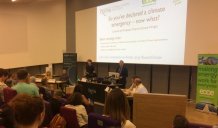Articles

The University of Exeter declared an environment and climate emergency this week
Climate emergency debated at University of Exeter
Hundreds of people gathered to discuss climate and environmental issues at the University of Exeter last night (Thursday).
Following the university’s declaration of an environment and climate emergency this week, researchers, activists, local politicians and the public debated what actions should be taken.
A packed auditorium at the university’s Streatham Campus in Exeter – connected via video link to the Penryn Campus in Cornwall – heard suggestions ranging from cutting air travel and overhauling energy supply, to lowering the voting age and holding citizens’ assemblies to involve the public in the process.
The event was organised by the university’s Global Systems Institute, which aims to find “networked solutions” to the planet’s problems.
“It was fantastic to see so many people and to hear such a diverse range of views on these critical issues,” said Professor Patrick Devine-Wright, who led the debate.
“The passion in the rooms was obvious, and the tone of discussions was really positive.”
As well as university researchers, the audience heard from Sophie Sleeman, of youth-led climate activist group Fridays 4 Future, who called for the voting age to be lowered to 16 and for a “green new deal” to de-carbonise the economy.
The audience voted on several questions.
Results included 88% of people supporting the view that it should be more expensive to buy things that contribute towards climate change, and 99% saying the government should move support from fossil fuels to renewable energy.
People were encouraged to tweet using the hashtag #ExeterClimate.
One audience member tweeted: “A packed house at the @GSI_Exeter @UniofExeter talk on declaring a climate emergency and what to do next. Incredible to see the engagement of not only staff and students but also local communities. Most definitely a step in the right direction #ExeterClimate.”
Another wrote: “We’re at @UniofExeter tonight to learn more about what we can do to address the #ClimateEmergency Spoiler alert: it’s not going to be easy or painless but it is absolutely necessary for the future of our planet #exeterclimate.”
Panel members put forward various suggestions, including giving local authorities more power to control the way land is used for new housing.
Professor Richard Betts, of the University of Exeter and the Met Office Hadley Centre, said one useful step would be to buy less “plastic tat” from overseas.
Following its declaration of an environment and climate emergency, the University of Exeter has established a team, led by Professor Juliet Osborne, to focus on the actions required based on evidence and science.
In response to the event, Professor Tim Lenton, Director of the Global Systems Institute, said: “I am excited by the potential to convene an Exeter Citizen’s Assembly on Climate Change, which as experts on the subject we will commit to supporting and participating in.”
Date: 24 May 2019
